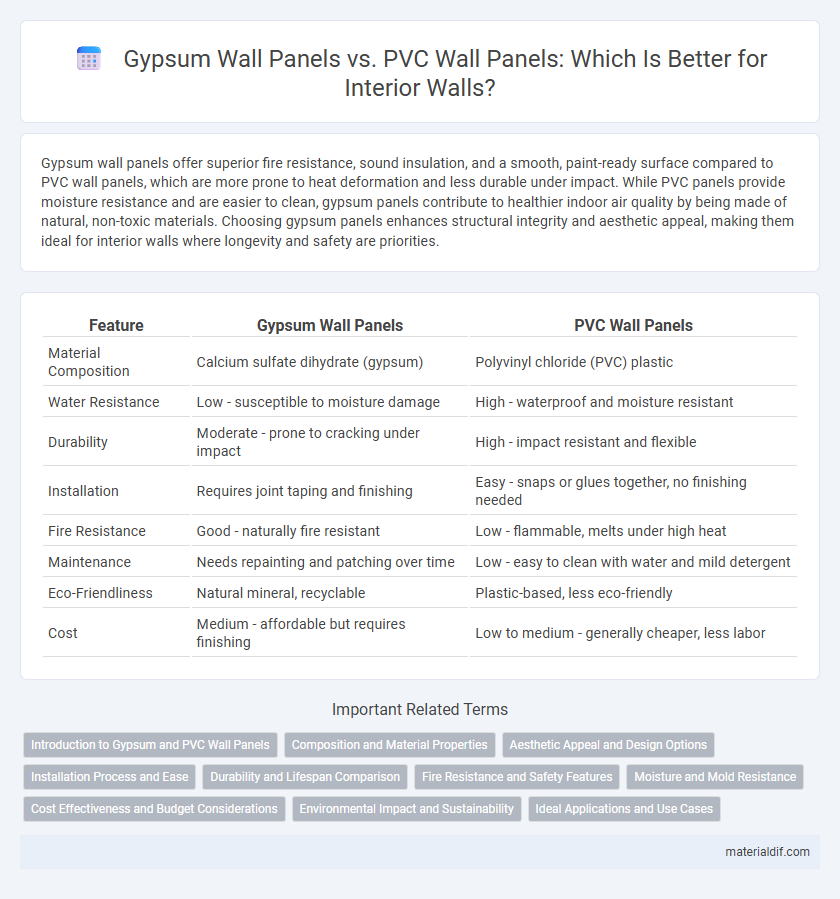Gypsum wall panels offer superior fire resistance, sound insulation, and a smooth, paint-ready surface compared to PVC wall panels, which are more prone to heat deformation and less durable under impact. While PVC panels provide moisture resistance and are easier to clean, gypsum panels contribute to healthier indoor air quality by being made of natural, non-toxic materials. Choosing gypsum panels enhances structural integrity and aesthetic appeal, making them ideal for interior walls where longevity and safety are priorities.
Table of Comparison
| Feature | Gypsum Wall Panels | PVC Wall Panels |
|---|---|---|
| Material Composition | Calcium sulfate dihydrate (gypsum) | Polyvinyl chloride (PVC) plastic |
| Water Resistance | Low - susceptible to moisture damage | High - waterproof and moisture resistant |
| Durability | Moderate - prone to cracking under impact | High - impact resistant and flexible |
| Installation | Requires joint taping and finishing | Easy - snaps or glues together, no finishing needed |
| Fire Resistance | Good - naturally fire resistant | Low - flammable, melts under high heat |
| Maintenance | Needs repainting and patching over time | Low - easy to clean with water and mild detergent |
| Eco-Friendliness | Natural mineral, recyclable | Plastic-based, less eco-friendly |
| Cost | Medium - affordable but requires finishing | Low to medium - generally cheaper, less labor |
Introduction to Gypsum and PVC Wall Panels
Gypsum wall panels are composed of natural calcium sulfate dihydrate, offering superior fire resistance, sound insulation, and moisture regulation, making them ideal for interior applications. PVC wall panels are synthetic polymer-based, known for their lightweight, water resistance, and easy maintenance, primarily suited for wet environments like bathrooms and kitchens. Both materials provide versatile wall solutions, with gypsum excelling in durability and aesthetic finishes, while PVC panels specialize in flexibility and waterproof performance.
Composition and Material Properties
Gypsum wall panels consist primarily of calcium sulfate dihydrate, offering excellent fire resistance and sound insulation due to their dense, porous structure. PVC wall panels are made from polyvinyl chloride, providing high moisture resistance and durability but lower thermal insulation compared to gypsum. The inorganic composition of gypsum panels makes them more eco-friendly and biodegradable, whereas PVC panels are synthetic, non-biodegradable, and more prone to chemical degradation over time.
Aesthetic Appeal and Design Options
Gypsum wall panels offer a smooth, paintable surface that provides a versatile canvas for a wide range of colors, textures, and finishes, enhancing interior aesthetics. These panels allow for intricate molding and decorative designs that seamlessly blend with various architectural styles, making them ideal for customized looks. PVC wall panels, while durable and moisture-resistant, typically come in limited colors and patterns, offering less flexibility in achieving refined or detailed design aesthetics.
Installation Process and Ease
Gypsum wall panels offer a straightforward installation process with lightweight boards that can be easily cut to size and attached using nails or screws, reducing labor time. PVC wall panels provide a quick, snap-together installation system that requires minimal tools and is moisture-resistant, making them ideal for damp environments. Both materials emphasize ease of installation, with gypsum favored for indoor drywall applications and PVC preferred for areas prone to humidity.
Durability and Lifespan Comparison
Gypsum wall panels offer excellent fire resistance and sound insulation but are more susceptible to moisture damage, reducing their lifespan in humid environments. PVC wall panels provide superior durability against water, mold, and impact, making them ideal for wet or high-traffic areas with a longer lifespan, often exceeding 20 years. Choosing between gypsum and PVC depends on environmental conditions and maintenance needs, with PVC panels outperforming gypsum in durability over time.
Fire Resistance and Safety Features
Gypsum wall panels exhibit superior fire resistance due to their calcium sulfate dihydrate composition, which releases water vapor when heated, slowing fire spread and providing critical evacuation time. PVC wall panels, primarily made from polyvinyl chloride, have lower fire resistance and can emit toxic fumes when burned, posing additional safety risks. Fire safety codes often prioritize gypsum boards in construction for enhanced passive fire protection and reduced flammability hazards.
Moisture and Mold Resistance
Gypsum wall panels offer moderate moisture resistance but are prone to mold growth when exposed to prolonged damp conditions, requiring additional treatments or coatings for enhanced protection. PVC wall panels provide superior moisture resistance, being non-porous and impermeable, which effectively prevents mold formation and is ideal for high-humidity environments. Selecting PVC panels ensures long-term durability and hygiene in moisture-prone areas compared to traditional gypsum alternatives.
Cost Effectiveness and Budget Considerations
Gypsum wall panels generally offer greater cost-effectiveness due to their lower initial material and installation costs compared to PVC wall panels, making them ideal for budget-conscious projects. PVC wall panels, while more expensive, provide enhanced durability and moisture resistance, potentially reducing long-term maintenance expenses. Selecting gypsum panels supports a more affordable upfront investment, while PVC panels may be preferable where higher moisture resistance justifies the increased initial expenditure.
Environmental Impact and Sustainability
Gypsum wall panels offer a more sustainable option compared to PVC wall panels due to their natural composition and recyclability, reducing long-term environmental impact. Gypsum, a mineral commonly sourced from abundant natural deposits or as a byproduct from industrial processes, is biodegradable and has lower carbon emissions during production. PVC wall panels, made from petroleum-based plastics, contribute to pollution and are challenging to recycle, resulting in greater environmental harm throughout their lifecycle.
Ideal Applications and Use Cases
Gypsum wall panels are ideal for interior applications requiring fire resistance, sound insulation, and smooth finishes, such as residential walls, office partitions, and commercial ceilings. PVC wall panels excel in moisture-prone environments like bathrooms, kitchens, and laundry rooms due to their water resistance and easy maintenance. Both materials serve specific use cases: gypsum for structural and aesthetic interior walls, PVC for humid areas needing durable, water-resistant surfaces.
Gypsum wall panels vs PVC wall panels Infographic

 materialdif.com
materialdif.com